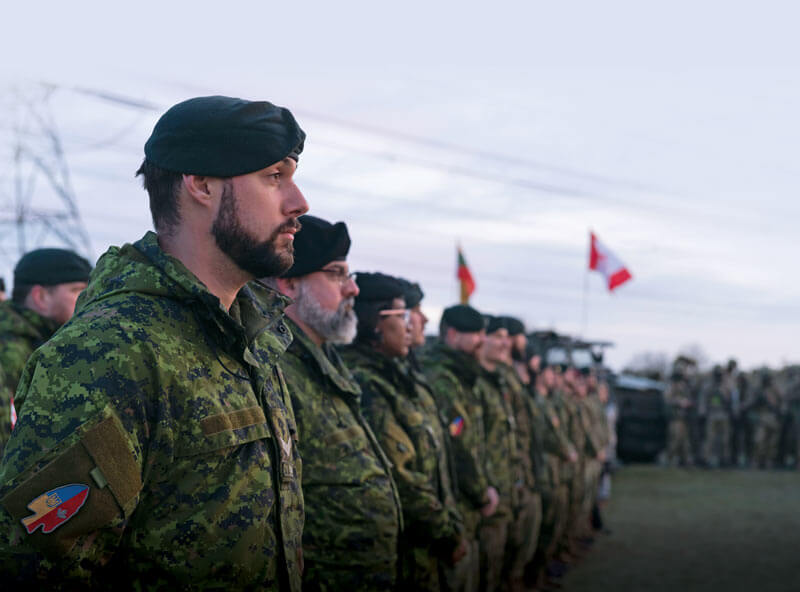
Canadian Armed Forces personnel helping to train Ukrainian soldiers gather in the U.K. to commemorate the one-year anniversary of Russia’s 2022 invasion.[Corporal Eric Greico, CAF Photo]
If there is anyone left in Canada who still believes the current government has any understanding of the importance of defence for the country, Sept. 28, 2023, should set them straight. Governments usually reserve late-week business for announcements they hope will get little attention and this one was no exception.
On that day, defence chief General Wayne Eyre and Deputy Minister of Defence Bill Matthews told the Commons defence committee that the national defence budget would be cut by about $1 billion, just as other departments will also cut their budgets in an effort to tackle the country’s estimated $40-billion deficit for fiscal 2023-24 and the accumulated $1.13-trillion federal debt.
Coincidentally, former defence minister Anita Anand is now in charge of making this nation’s budget problem go away as the president of the Treasury Board, a position she assumed after a summer 2023 cabinet shuffle. Anand announced that she would be seeking $15 billion in cuts from departmental budgets during the next five years, a tiny fraction of Canada’s national debt.
Okay, she has to start somewhere, especially with such a profligate government. According to the Fraser Institute, Prime Minister Justin Trudeau’s Liberal government has logged the five highest years of per-person spending in the country’s history. But given the state of the national defence budget, and the huge shortfall between what Canada needs to spend both to improve continental defence and to help strengthen NATO in the face of Russia’s aggression against Ukraine, any cuts to the defence budget are astounding.
At a meeting this past July, NATO members agreed that they must each spend “at least two per cent” of their gross domestic product on defence. Canada, represented by the prime minister himself, endorsed the resolution, despite reports that indicate he proclaimed months previously that the country would never achieve the spending target.
How does he know that? His government made the choice. And he chose long ago to make defence spending optional. Deciding not to raise the defence budget is not pre-ordained by some existential power or authority. It happens because people in power make the decision. Choices are made to spend money on health, dental and child care, and to compensate Indigenous Peoples for past wrongs, among other governmental priorities.
On the current government’s list of spending choices, defence is not high.
These may be perfectly worthwhile policy choices when a government is properly administered, when there are surpluses, when there is room to manoeuvre, when one item can be delayed a year or two or three, while another item is addressed sooner. And in the case of defence, which is one of the main reasons to have an organized government, all other choices must be second.
This is a fact that Canadian governments have forgotten since well before the end of the Cold War when Canada started increasingly relying on the U.S. for its defence. In essence, that habit is a huge subsidy that the Americans hand Canada every year. Canadians sing about “The true North strong and free,” but it’s the Yankees who help pay for it and free up money for Canada to spend on other priorities.
On the current government’s list of spending choices, defence is not high. It seems as urgent as say, spending on national parks. If the budget for Parks Canada is going to get cut, why not defence as well? Spread out the pain that the government itself caused because of its own reckless accounting.
So, it delays purchases that must be made now, and waits to make them a decade later when the costs increase. Or they put, for instance, the country’s already out-of-date submarines into dry dock for refits. As far as the current government seems to be concerned, defence is nice to have, not need to have. So, if there are other ways to spend money, they will come first.
It is seriously time for NATO
—and the U.S.—to put real pressure on the Canadian government. From sanctions to trade embargoes, Canada deserves the whipping it would surely get. And if Canadian citizens don’t enjoy the punishment, there will be another election sooner or later.
Advertisement






















